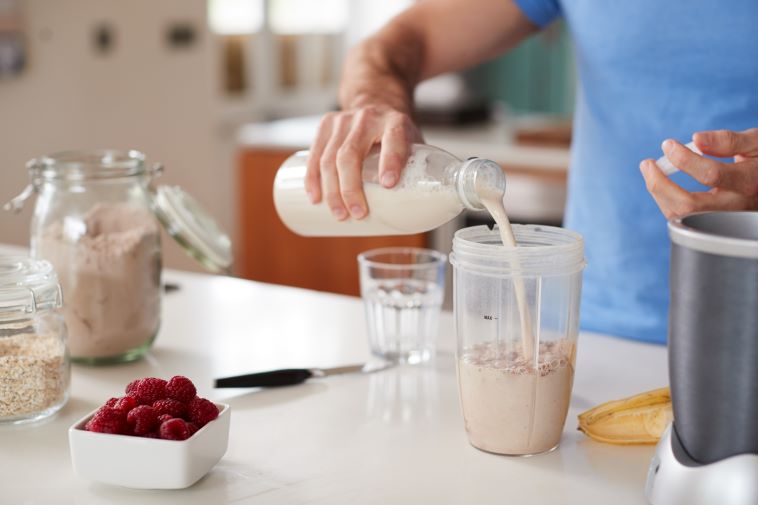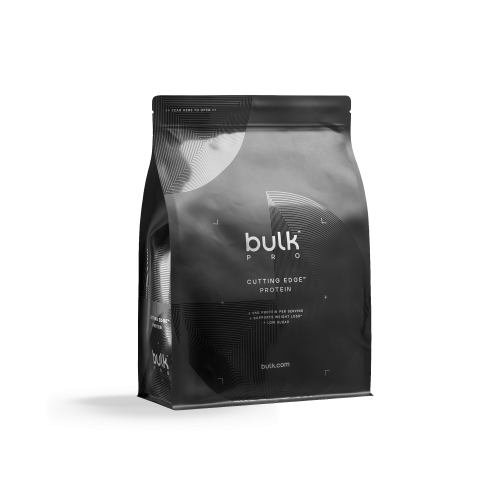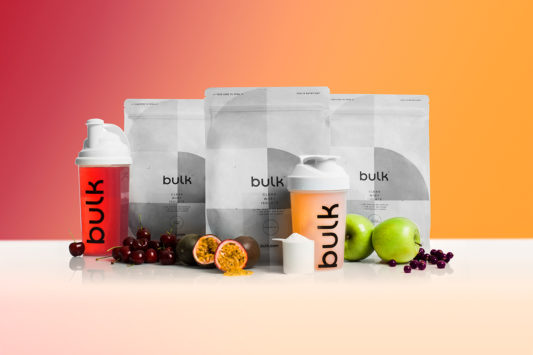Protein shakes are a popular and convenient way to add more protein to your diet. They’ve been shown to enhance muscle growth when paired with strength training and can also support fat loss without losing muscle.
Many people swear by a post-workout protein shake to maximise the results of their training. However, there are also benefits to be gained from consuming protein before training and at different times throughout the day. Here we’ll look at the facts surrounding the timing of protein consumption and the potential benefits available, whether you’re a seasoned athlete or at the start of your fitness journey.
How do Protein Shakes Work?
Protein shakes provide the body with amino acids (the building blocks of protein) which are involved in almost every bodily function, including nutrient absorption, muscle repair, and protein synthesis.
Muscle protein synthesis (MPS) is a biological process which enables muscles to recover from exercise, build strength and increase in size. However, the benefits are only effective when MPS exceeds the opposing process of muscle protein breakdown (MPB), and our muscles are in a constant cycle involving both processes.
For example, when we consume protein, MPS rates rise and once MPS exceeds MPB rates, this is referred to as a “positive protein balance” and results in muscle gain. Conversely, when in a fasted state, MPB rates rise, and if they exceed MPS rates this is known as a “negative protein balance” and can result in muscle loss.
Muscle protein breakdown may sound negative. However, studies have shown that we need some level of MPB to optimally maximise muscle growth and adapt to exercise. That’s because this process allows the body to break down muscle proteins damaged from exercise and recycle some of them into new muscle proteins.
Who Needs Protein Shakes?
Whether your goal is weight loss, muscle gain, or generally improving your fitness, protein shakes can assist your progress in many ways thanks to their wide range of benefits. Protein shakes support muscle gain, enhance recovery, improve performance, reduce muscle loss, and help to maintain muscle mass, even during weight loss.

What Is The “Anabolic Window”?
The “anabolic window” is a theory which refers to the 30-60-minute window of time after exercise. The key idea is that consuming protein during this period provides maximum muscle-building benefits, however, there’s little scientific evidence to support this.
What Does This Mean?
Anabolic means to “build up” whereas catabolic means to “break down”. Anabolism and catabolism are the two opposing sides of your metabolism. Exercise and consuming protein are two major anabolic stimuli that increase muscle protein synthesis (MPS) rates.
The “anabolic window” strategy involves consuming protein within 30-60 minutes of exercise to shift the body from a catabolic state to an anabolic state. However, research shows that this window is much larger than previously thought and both pre and post-workout protein intake can produce similar adaptations to muscle tissue when paired with strength training. Research shows that consuming protein within this “anabolic window” to maximise MPS and minimise MPB is only significant if training fasted (on an empty stomach).
When Is the Best Time to Take Protein?
This is a widely debated topic as there are benefits to be gained from taking protein at many different times throughout the day, from breakfast, before and after training, between meals and even before bed. The honest answer is the “best time” to take protein is entirely dependent on your personal preferences, lifestyle, and goals. The overall amount, quality and frequency of protein consumption is generally more important than the time of day it is taken.
Pre-Workout Vs Post Workout
Many people consider immediately after training to be the best time to take a protein shake. However, research shows the significance of this depends on whether you’re in a fasted or fed state. If you’ve consumed protein before training, then a shake immediately after training is not as essential as many believe. However, since a post-workout shake is convenient for most people, it may still be the ideal time for you to have a shake to help achieve your daily protein goals.

On the other hand, if you haven’t had any protein before training, several studies have shown that having a protein shake before exercise is in fact more effective to elevate MPS rates, rather than after. However, for those who prefer not to eat before training and choose to train in a fasted state, it is important to consume protein shortly after training to elevate MPS rates and minimise MPB.
Protein before bed Vs Protein in the morning
Because our bodies don’t store excess protein, it’s important to consume it regularly as it’s vital for the basic function of every cell in our bodies. Eating a high-protein breakfast has been shown to support weight loss and improve muscle health by increasing muscle mass, energy expenditure (calorie output), satiety ‘fullness’ hormones and reducing the desire to snack at night. A high protein breakfast has also been shown to help regulate blood sugar for up to 4 hours after eating.
Drinking a protein shake before bed also offers some surprising benefits and provides a perfect opportunity to stimulate MPS as you sleep. Having a protein shake before bed has also been shown to help boost your daily energy metabolism, (which can contribute towards weight loss) and has been shown to help improve the overall quality of sleep.
Research supports using a slow-acting protein such as casein before bed as this delivers a slower, sustained release of amino acids while you sleep. This being said, whey, casein and soy are all “complete” protein sources and the differences between their muscle-building properties are minimal. The primary difference is their speed of digestion.
Whey, the undisputed champion of protein supplements in both its popularity and efficiency, is a more rapidly digesting protein and has been shown to stimulate the rates of MPS most effectively. Therefore, whey is most commonly used as a post or pre-workout shake and at breakfast. Whereas casein and soy are both slower digesting proteins (casein being the slowest), meaning they stimulate MPS for longer so are more suitable for use before bed.
Final Word
Regardless of your goals, your overall daily protein intake is of greater significance than whether you have a shake before or after training, so prioritise this first. For most people around 1.2-2g protein per kg of body weight per day is sufficient.
Protein shakes are undoubtedly a helpful addition to your diet to support your training. However, it’s important to remember that protein shakes are intended to supplement your diet to help you achieve your protein goals and should not be used to replace whole foods, which your body needs to gain a full spectrum of essential nutrients.
For more nutrition tips, recipes and ambassador workouts, check out @bulk and get involved in the conversation by tagging #TeamBulk and be part of our community.
About the Author
Stephanie Yates is a nutrition coach and writer with a BSc in Food and Nutrition. She utilises her knowledge and passion for nutrition and fitness to deliver evidence-based, informative articles and guidance, helping others meet their fitness and health goals to feel their best – inside and out. You can find her on Instagram @electricmango__ for more fitness and nutrition tips.
References
- Aragon, A. and Schoenfeld, B., 2013. Nutrient timing revisited: is there a post-exercise anabolic window?. Journal of the International Society of Sports Nutrition, 10(1).
- Burd, N., West, D., Moore, D., Atherton, P., Staples, A., Prior, T., Tang, J., Rennie, M., Baker, S. and Phillips, S. (2011). Enhanced Amino Acid Sensitivity of Myofibrillar Protein Synthesis Persists for up to 24 h after Resistance Exercise in Young Men. The Journal of Nutrition, 141(4), pp.568-573.
- Devries MC, Phillips SM. Supplemental protein in support of muscle mass and health: advantage whey. J Food Sci. 2015 Mar;80 Suppl 1:A8-A15. doi: 10.1111/1750-3841.12802. PMID: 25757896.
- Gordon, Bradley & Kelleher, Andrew & Kimball, Scot. (2013). Regulation of Muscle Protein Synthesis and the Effects of Catabolic States. The international journal of biochemistry & cell biology. 45. 10.1016/j.biocel.2013.05.039.
- Halton, Thomas & Hu, Frank. (2004). The Effects of High Protein Diets on Thermogenesis, Satiety and Weight Loss: A Critical Review. Journal of the American College of Nutrition. 23. 373-85. 10.1080/07315724.2004.10719381.
- Hector AJ, Marcotte GR, Churchward-Venne TA, Murphy CH, Breen L, von Allmen M, Baker SK, Phillips SM. Whey protein supplementation preserves postprandial myofibrillar protein synthesis during short-term energy restriction in overweight and obese adults. J Nutr. 2015 Feb;145(2):246-52. doi: 10.3945/jn.114.200832. Epub 2014 Dec 17. Erratum in: J Nutr. 2015 Jun;145(6):1373. PMID: 25644344.
- Helms, Eric & Aragon, Alan & Fitschen, Peter. (2014). Evidence-based recommendations for natural bodybuilding contest preparation: Nutrition and supplementation. Journal of the International Society of Sports Nutrition. 11. 20. 10.1186/1550-2783-11-20.
- Hoertel, Heather & Will, Matthew & Leidy, Heather. (2014). A randomized crossover, pilot study examining the effects of a normal protein vs. high protein breakfast on food cravings and reward signals in overweight/obese “breakfast skipping”, late-adolescent girls. Nutrition journal. 13. 80. 10.1186/1475-2891-13-80.
- Mamerow, M., Mettler, J., English, K., Casperson, S., Arentson-Lantz, E., Sheffield-Moore, M., Layman, D. and Paddon-Jones, D. (2014). Dietary Protein Distribution Positively Influences 24-h Muscle Protein Synthesis in Healthy Adults. The Journal of Nutrition, 144(6), pp.876-880.
- Pasiakos, Stefan & McLellan, Tom & Lieberman, Harris. (2014). The Effects of Protein Supplements on Muscle Mass, Strength, and Aerobic and Anaerobic Power in Healthy Adults: A Systematic Review. Sports medicine (Auckland, N.Z.). 45. 10.1007/s40279-014-0242-2.
- Reidy PT, Rasmussen BB. Role of Ingested Amino Acids and Protein in the Promotion of Resistance Exercise-Induced Muscle Protein Anabolism. J Nutr. 2016 Feb;146(2):155-83. doi: 10.3945/jn.114.203208. Epub 2016 Jan 13. PMID: 26764320; PMCID: PMC4725426.
- Schoenfeld, B. J., Aragon, A., Wilborn, C., Urbina, S. L., Hayward, S. E., & Krieger, J. (2017). Pre- versus post-exercise protein intake has similar effects on muscular adaptations. PeerJ, 5. https://doi.org/10.7717/peerj.2825
- Snijders T, Res PT, Smeets JS, van Vliet S, van Kranenburg J, Maase K, Kies AK, Verdijk LB, van Loon LJ. Protein Ingestion before Sleep Increases Muscle Mass and Strength Gains during Prolonged Resistance-Type Exercise Training in Healthy Young Men. J Nutr. 2015 Jun;145(6):1178-84. doi: 10.3945/jn.114.208371. Epub 2015 Apr 29. PMID: 25926415.
- Snijders, Tim & Trommelen, Jorn & Kouw, Imre & Holwerda, Andy & Verdijk, Lex & Loon, Luc. (2019). The Impact of Pre-sleep Protein Ingestion on the Skeletal Muscle Adaptive Response to Exercise in Humans: An Update. Frontiers in Nutrition. 6. 10.3389/fnut.2019.00017.
- Tipton KD, Rasmussen BB, Miller SL, Wolf SE, Owens-Stovall SK, Petrini BE, Wolfe RR. Timing of amino acid-carbohydrate ingestion alters anabolic response of muscle to resistance exercise. Am J Physiol Endocrinol Metab. 2001 Aug;281(2):E197-206. doi: 10.1152/ajpendo.2001.281.2.E197. PMID: 11440894.
- Trommelen J, van Loon LJ. Pre-Sleep Protein Ingestion to Improve the Skeletal Muscle Adaptive Response to Exercise Training. Nutrients. 2016 Nov 28;8(12):763. Doi: 10.3390/nu8120763. PMID: 27916799; PMCID: PMC5188418.









